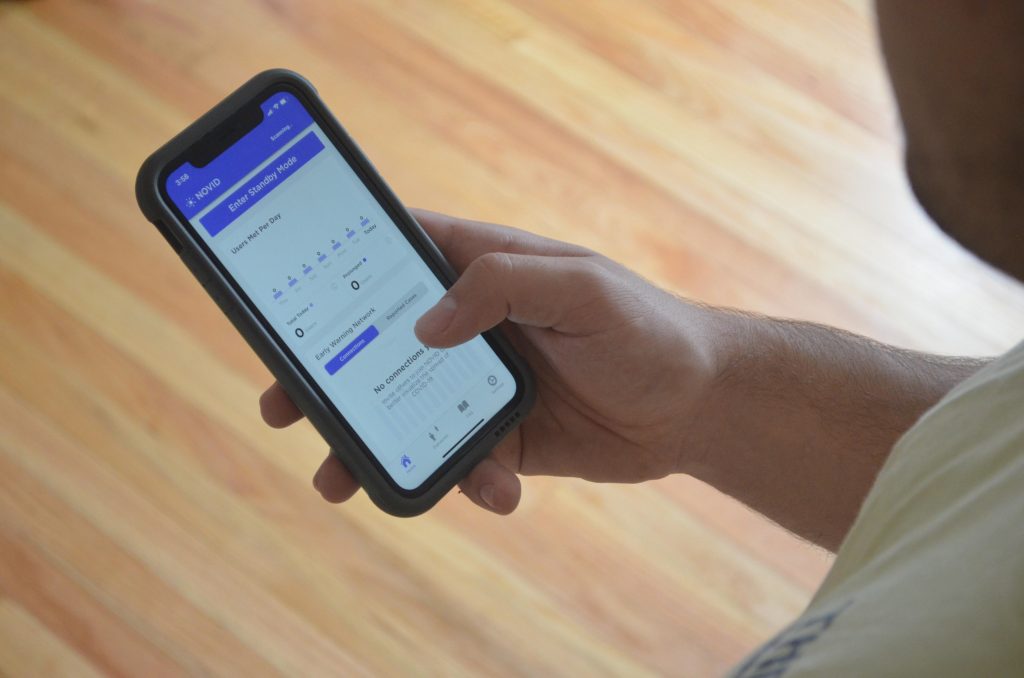As Binghamton University continues to test its students for the coronavirus, NOVID, an anonymous contact-tracing app developed at Carnegie Mellon University, has been touted as a solution to easily identify if an individual may have come into contact with people infected with the disease.
According to its website, NOVID provides an early warning system that notifies users after they have come into contact with another person who self-reported as being infected with COVID-19. “Contact” is defined as being within nine feet of a COVID-19 positive NOVID user for 15 minutes. Distance is measured by using a combination of ultrasonic frequencies, inaudible sounds that can be picked up by an individual’s own phone, and Bluetooth signals, wireless technology that exchanges data between phones.
After downloading the app, which is free on both the Apple App Store and Google Play, users can simply allow the app to run in the background, and NOVID will build an anonymous network of connections the user has with other users.
Lior Zweig, a junior majoring in integrative neuroscience, is the ambassador for NOVID at BU. Zweig described the NOVID approach as more efficient than traditional contact-tracing methods.
“You self-report,” Zweig said. “It’s much faster than contact tracing, because if a contact-tracer were to call you and say you were exposed, that could happen multiple days after the incident, whereas this is immediately. Also, it tells you two to three connections down whether you’ve been exposed, while contact tracing is [more] direct.”
Zweig described the anonymity of the app as a powerful feature.
“Part of the appeal of NOVID is that it’s not created by a big company that sells your information and uses it to their own advantage,” Zweig said. “It’s created by actual scientists and mathematicians, who care about creating better public health.”
Additionally, Zweig said that the app’s use of ultrasound makes it more efficient.
“With other contact-tracing apps, [they] only use Bluetooth, whereas this app also uses ultrasound,” Zweig said. “Other apps might pick up you being exposed to somebody if they are a floor above you, because technically you are within distance that would lead to you being exposed. With NOVID they use ultrasound, so it’s a lot more precise.”
Through the use of student ambassadors and outreach coordinators, use of NOVID has already spread across multiple college campuses, with over 2,000 users in Georgia Institute of Technology as of Aug. 17. While not yet widely used at BU, Zweig aspires for this to change. In addition to contacting administration, Zweig has begun to spread the app throughout the student body.
“I was in touch with my instructor about NOVID and she’s been really open-minded about it,” Zweig said. “I just printed out flyers with QR codes for people to scan and download it, so I’m going to try and put those up too. I’ve made all my social circles use it.”
Faisal Alam, a sophomore double-majoring in political science and psychology, expressed interest in using an app such as NOVID, provided that transparency is respected.
“I, a person who prefers less overreach of technology in our lives, would make a sacrifice from my own beliefs and agree to use an app for contact tracing in Binghamton,” Alam said. “I would like to request the researchers to be transparent with what they will do with the data as that seems to be the main thing stopping people from using the app.”
Monika Hammer, the public information officer for Broome County’s COVID-19 response, noted that NOVID was not yet being considered by the official response team.
“The Broome County Health Department currently does all contact tracing locally,” Hammer said. “At this time they are not looking into that application.”
Nonetheless, the NOVID user base continues to grow. In Binghamton, Zweig views NOVID as not just an application, but a window for change within the community.
“I just want people to generally understand that their actions have consequences that impact the world around them,” Zweig said. “That’s not to say that they have to be perfect people who don’t partake in social activity. You can responsibly open up society in a contained way if you use contact-tracing apps. Changing public health, changing society and changing the general attitude of the student body toward something like this is very important.”



